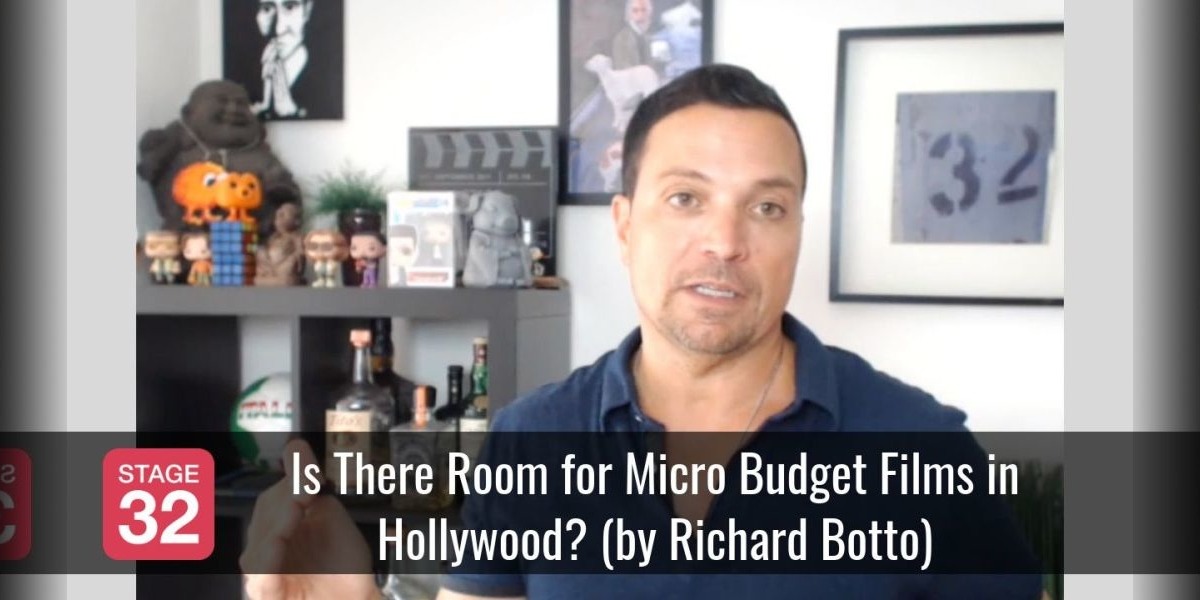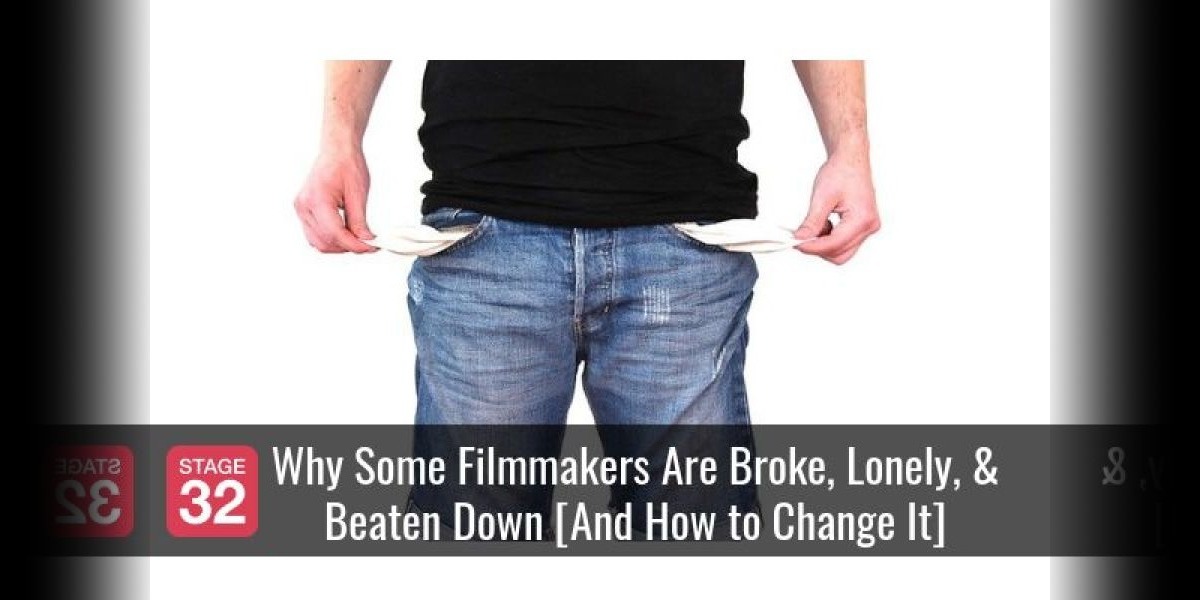Why Some Filmmakers Are Broke, Lonely, & Beaten Down [And How to Change It]
I entered 2019 completely broke. I live for free in a guest house with my fiancé, so my expenses equated to my insurance and groceries. I couldn’t afford them the following month. That’s how broke I was. I never thought I’d be that person. Why was I broke? it wasn't long before I realized my lack of cash was anchored in the false argument of ART VS. COMMERCE.

How did I get in this position?
I had a movie that was premiering on SHOWTIME in two weeks, DVDs were in Walmart, eight projects produced and released the previous year, and multiple meetings with production companies and producers.
What happened?
I was beaten down and lost. I no longer had any money left to make my own work and practice my craft. After crying for an hour and unable to sleep, I turned to my fiancé in bed and said, “Babe, it’s time.” We got jobs. We got regular, menial, cash jobs. And you know what? It changed everything.
The minute we had cash coming in, I started reading books on money management, cash flow, investing, and saving. All of a sudden our zero savings account doubled every month. We were conscious of our income and expenses and cut all the crap we were spending money on that was getting in the way of us reaching our financial goals.
Every month we worked harder and, of course, more opportunities presented themselves because that’s just how the Universe works. At the rate we were saving, we could fund our own micro-budget feature film and still have money left over in our savings. Talk about empowerment.
Some of you may be wondering why I’m babbling on about personal finances in a blog tailored to filmmakers. Well, as I speak with my filmmaker friends and other filmmakers on social media, I find the topic of personal finances to be very taboo. No one wants to admit how broke they really are. Not only that, they have no idea about proper money management practices.
Everyone wants to be further along than they are, but often feel stuck because they don’t have the means to take themselves to the next level.
You want to know the best way to take your career to the next level?
Get really good at what you do and put it out there.
Want to know how to get really good at what you do?
Practice.
It takes money to practice our craft in this industry. Not always a lot of money, but some. So let’s get educated on how we can get more money-energy to invest in ourselves.
1) Know Your Cash Flow

Meet yourself where you are.
Pull up a blank spreadsheet and your bank statement. Mark one side of your spreadsheet as EXPENSES and the other side INCOME. Write out all of your expenses for the month and categorize them. Then, input your income for the month. If your income is greater than your expenses then you’re in POSITIVE CASHFLOW. The excess can go into your savings.
If your expenses outweigh your income then you’re in NEGATIVE CASHFLOW. You’ll want to decrease your expenses, track them, and find a way to increase your income.
2) Increase Your Income
Own your side hustle.
Now here’s where people go wrong with their side hustles: They don’t have specific goals. I’m not talking about having the goal of: "I’m going to quit this job when I book this role or book this gig." Nope. I’m talking about having very specific financial goals. Get serious about your side hustle.
For instance, you need $2000 extra by the end of the month to shoot the music video for your super talented musician friend. You drive for Lyft. In the past, you’ve been coasting through driving a little here and there to pick up some extra cash. Now with your very specific goal, you clock in 8 hours of driving a day 6 days a week and rack in a surplus of $2K after expenses at the end of the month to put towards your shoot. Imagine being able to do that every month.
It doesn’t matter if you’re waiting tables, driving for Uber, building websites for people, or stacking groceries at your local market. You want freedom in your life and your work? You need money coming in consistently.
3) Live Below Your Means
No more FOMO (Fear of missing out).
We’ve heard this before, but we have no idea how far above our means we’re living until we track it. I thought I was the most frugal person in the world until I saw that I spent $1200 on restaurants, bars, and food in one month. Oh yes. Every dinner meeting, catch up with friends, collaborative get together, party, etc. all left me with no money and no work.
Networking is key, yes. However, be smart and efficient about it.
When time is money and money is tight, it’s important to get focused. Meet friends for free, meet collaborators for coffee. We hang out with friends, but not as often as we used to. This is a part of getting focused. We put a little money aside each month from extra cash we get in tips for hanging out with friends, but mostly we try to find ways to hang out with people for free. Hikes, having people over, the beach, get creative. However, at the end of the day, you’re going to have to make some sacrifices when it comes to your social life. Not every party is a networking event. If you’re out partying (or at home watching Netflix) instead of working, then your goals will suffer.
Collaborator meetings are a business expense, so that we spend a little money on. Those are also planned out with specific objectives we want to cover in the meeting so we aren’t just chatting and not getting anything out of the time together.
4) Understanding Sales, Cashflow, & Assets

When I started getting serious about my personal cashflow, I became much more aware of cashflow inefficiencies in film distribution. My feature film, Mail Order Monster, had its domestic release in 2018, and I’ve been heavily involved (as much as I can be with a distributor) in the distribution process. It is through this experience that I noticed how and why many filmmakers feel beaten down and poor even after making a movie.
Because I was that person.
Even after the film made some decent international sales, got on SHOWTIME, and in Walmart stores as well as multiple streaming platforms, I was baffled at the negative cashflow of the film. I didn’t go into producing the movie with bright, naive expectations and no education. I did all the research, had consults, the whole 9 yards. I really did my due diligence. But NOTHING beats experience.
I noticed something that no one brings up when it comes to film sales…most distribution companies don’t know sales and the system is not set up for you to be cash positive. Yes, there are plenty of exceptions in the independent film space, but the majority of cases do not end up cash positive or breaking even. Why is this? We (or the investor) put up 100% of the risk and the distributor controls 100% of the revenue with little to no risk since they recoup their minimal expenses first.
Distribution companies do not sell your movie the way a startup company sells a product. They do not go out there and hustle your film and knock on doors. They manage their risk of films in their slate and leverage them against each other to make sure their business is cash positive at the end of the day. This is not meant to be a depressing reality. This is just the reality and when you can start looking at everything from a cashflow lens, you are able to make MUCH better decisions.
At the end of the day, YOU are the one who has the asset - the film. However, that film is only an asset (something that produces cash flow and increases in value over time) if you position it correctly. So, here’s what you can do:
5) Cast for the Future
One of the best things we did in Mail Order Monster was cast Madison Horcher as the lead. Everyone talks about how great she is. Having a super talented, hardworking, and kind lead child actor with a promising career in front of her only helps our film increase in value in the future as her career grows.
I don’t think name actors are always entirely worth it. They rarely are worth their name and unless they commit in writing to doing in-depth specific marketing for your film, they aren’t worth the money. Invest in future talent and keep your budget low.
6) Invest in Your Sales Relationships
I was able to lock down the Australian distribution of Mail Order Monster on my own without my sales agent. This proves you don’t need them if you have the relationships yourself. This doesn’t mean forget traditional distribution and do it all yourself. However, sales is relationships. My father is in sales and he always said, “I don’t make sales. I make friends.”
The more involved I got in the distribution process, the more I realized how removed most distributors are today. They don’t make meaningful relationships or friends. They just depend on aggregators and keeping their expenses low.
Create a savings account for going to film markets, conferences, consults and meetings with sales people and producers. Do your research and bring meaningful questions that will allow you to make meaningful relationships so you provide just as much value to them as they provide to you.
7) Keep Grinding and Be Patient

I have a fundamental issue with how distributors utilize release windows. They rely on so many stars aligning outside of your control and are rarely in line with what will best position the film.
My film suffered from this, but instead of doing what most filmmakers do, which is dropping it as the distributors do, I keep pushing. I keep marketing, I keep reaching out to collaborators, and the film keeps thriving. It is a slow grind, but it keeps moving. The more I keep moving and putting energy into it, the more energy it gives back.
For instance, Mail Order Monster now has a relationship with the Girl Scouts of Southern Nevada based on a cold email and phone call sent to an organization that resonates with the film’s core audience. They’re setting up a screening for their girls and their mothers in the coming months.
As I grow as a filmmaker and become more of an asset to other productions, so does my previous work. That’s what makes films a different kind of investment. It can be a short term cashflow investment or a long term investment depending on the market type, the quality of the film, and how you positioned it.
Movies don’t fail.
Filmmakers just quit.
Most of our money problems stem around a false battle of ART vs. COMMERCE. This automatically puts us against money. It makes money evil and scarce, but at the same time something we need…I hope this dysfunctional thinking is clear here.
I’m here to let you guys in on a little secret. Art IS commerce. This entire industry is proof of that. The fact that a script or book can have an intellectual property value sold for thousands if not millions of dollars is proof of that. This is not an argument of art vs. commerce. This is an argument of good investments vs. bad investments. This is an argument of financial intelligence in our industry vs. financial ignorance.
Many people in this industry don’t have jobs (**cough** middlemen distributors **cough**) if you’re financially “woke” because then they cannot manipulate you into giving them your assets for nothing.
Empowerment is knowledge.
Let’s get educated and get rich.

About Paulina Lagudi: After graduating Chapman University, Paulina moved to Los Angeles to pursue her filmmaking endeavors. Aware of the extremely small percentage of female filmmakers working in Hollywood, Paulina decided this was the perfect opportunity to create her own films as well as launch her production company Jax Productions, LLC, named after her first rescue dog, Jax.
Since launching in June 2015, Paulina has written and produced short films, multiple commercials and online branded content. She also wrote, produced, and directed the feature film MAIL ORDER MONSTER that was released worldwide and is on SHOWTIME as well as DVD's in Walmart.
She has also been hired by a major production company to write a true story family feature film set to release in 2021.
She has since changed her company from JAX PRODUCTIONS to SAY LITTLE PRODUCTIONS while also launching her course THE PRODUCER BOOTCAMP that takes filmmakers with only a script in their hands to go on and make their first feature film.
Let's hear your thoughts in the comments below!
Got an idea for a post? Or have you collaborated with Stage 32 members to create a project? We'd love to hear about it. Email Joleene at joleene@stage32.com and let's get your post published!
Please help support your fellow Stage 32ers by sharing this on social. Check out the social media buttons at the top to share on Instagram @stage32online Twitter @stage32 Facebook @stage32 and LinkedIn @stage32
| What Stage Are You at With Your Writing Career? |
| Is There Room for Micro Budget Films in Hollywood? (by Richard Botto) |
Search Stage 32 Blog
There are now 4040 blog posts for you to enjoy. Search them all by tags below.
Acting, Advice, Cinematography, Coffee & Content, Composing, Contests, Distribution, Featured, Filmmaking, Financing, Inspirational, Networking, Producing, Screenwriting, Success Stories, Tips, Trending,Relevant Tags
Recommended Articles

Coffee & Content: Why Your Next Step Matters More Than the Perfect Step

State of the Industry 2026 Now On-Demand: RB & Geoff Break Down What’s Next for Writers!

7 Life Hacks For Creatives

4 Reasons To Have Audio Description On Your Film

Coffee & Content: Why Your Pitch Needs to Be Human

A Practical Guide for Actors: Tips & Advice Every Performer Should Know

Insider Intel: The Studio War & The Rise of Indies

Coffee & Content: Reinvent the Story, Reinvent the Industry

Stage 32 Featured at the 43rd Torino Film Festival!






